Tripe soup
Tripe soup or tripe stew is a soup or stew made with tripe (cow or lamb/mutton stomach).
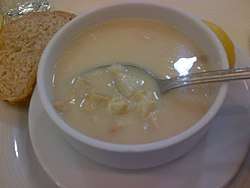 Tripe soup (işkembe çorbası) from Turkey | |
| Course | Soup |
|---|---|
| Main ingredients | Offal (Tripe) |
Variants
Middle East and Southeastern Europe
Tripe chorba is a common dish in Balkan, Eastern European and Middle Eastern cuisines. It is widely (not universally) considered to be a hangover remedy.[1][2][3][4]
In Bulgarian and Serbian cuisines, tripe soup is known as škembe čorba (шкембе чорба).
In Greek cuisine, tripe soup is known as patsas (Greek: πατσάς).
In Romanian cuisine, tripe ciorbă is known as ciorbă de burtă. If sour base made of fermented wheat bran called borş is used in sour tripe soup, the sour soup is called a borş, not a ciorbă.[5]
In Turkish cuisine, tripe chorba is known as işkembe çorbası.
In Iranian cuisine, sirabi also known as sirab shir-dun is the name for tripe soup and it can be made with either calf or cow tripe or lamb tripe.[6]
.jpg) İşkembe çorbası
İşkembe çorbası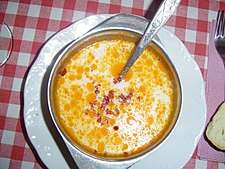 Škembe čorba
Škembe čorba
Central Europe
In Croatian cuisine, it is known as Fileki, Tripice or Vampi.
In Czech cuisine, tripe soup is heavily spiced with paprika, onions and garlic resulting in very distinct spicy goulash-like flavour. The Czech name is drštková polévka, often shortened to drštkovka.
In German cuisine, there are a number of different versions of sour tripe soup from southern parts of the country, including Bavaria, Saxony and Swabia. Seasonings include lard, onions, garlic, meat broth, wine vinegar, bay leaf, salt, and pepper. In the nineteenth century in parts of the German Empire that are now Poland (like Silesia), "Flaki" was a street food. The tripe was cooked with long bones, celery root, parsley root, onions, and bay leaf. The tripe was then sliced, breaded and fried, and returned to the broth with some vinegar, marjoram, mustard, salt, and pepper.
In Hungarian cuisine, tripe soup is called pacalleves or simply pacal. Pacalpörkölt is a tripe soup heavily spiced with paprika.
In Polish cuisine, tripe soup is known as flaki or flaczki.
In Slovak cuisine, it's known as držková polievka.
Western and Southern Europe
In French cuisine, tripes à la mode de Caen is a traditional dish of the cuisine of Normandy.
In Italian cuisine, trippa alla fiorentina is a traditional dish of the Florence and trippa alla milanese or busecca is a traditional dish of Milan. Caldume (Italian) or quarumi (Sicilian) is a Sicilian dish of veal tripe stewed with vegetables, served as a street food in Palermo and Catania.[7]
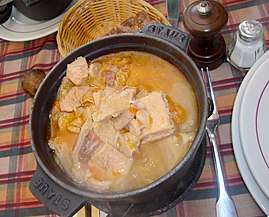 tripes à la mode de Caen
tripes à la mode de Caen Trippa alla fiorentina
Trippa alla fiorentina- Trippa alla milanese
North and South America
In Caribbean and Latin American cuisines, tripe soup known as sopa de mondongo is eaten.
In Mexican cuisine, menudo, a tripe soup with red chili pepper based-broth, is eaten.
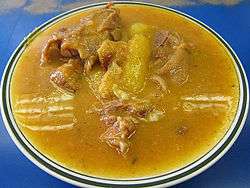 Sopa de mondongo
Sopa de mondongo- Menudo
East and Southeast Asia
In Chinese cuisine, Lanzhou-style lamian noodle soup is made with tripes.
In Indonesian cuisine, sekba or bektim is made using pork tripes and other offals.[8] It is one of Chinese-Indonesian dishes.
In Filipino cuisine, sopa de mondongo is eaten.
 Lanzhou lamian featuring tripes
Lanzhou lamian featuring tripes Sekba
Sekba
See also
References
- Dana Facaros, Linda Theodorou, Greece, Cadogan Guides, p. 110
- Heidi Johansen, Fodor's Mexico 2010, p. 443
- Annie Kay, Bulgaria, Bradt Travel Guides, 2015, p. 57
- DK Eyewitness Travel Guide: Istanbul, 2014, p. 199
- "Traditional Vegetarian Russian Cabbage Soup (Shchi)". about.com. Retrieved 23 March 2018.
- "8 Unusual Foods You Must Try In Iran". Traveldudes.org. SurfIran. 2017-03-02. Retrieved 2018-10-22.
- Christian Pancaro, La "Quarume", antico piatto dello street food palermitano", La Gazzetta Palermitana, 26 November 2014 full text
- Whitmarsh, A.; Wood, M. (2013). Jakarta: 25 Excursions in and Around the Indonesian Capital. Tuttle Publishing. p. 119. ISBN 978-1-4629-0893-6. Retrieved October 1, 2016.
Further reading
- Halbański, Maciej (1987). Leksykon sztuki kulinarnej. Warsaw: Watra. ISBN 978-83-225-0106-1.
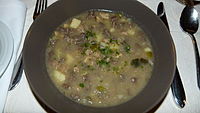
.jpg)